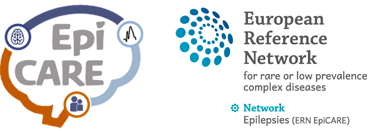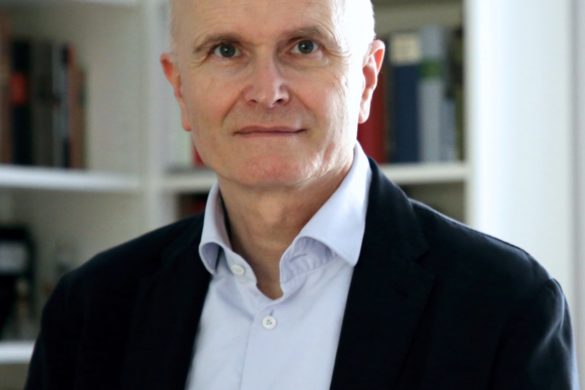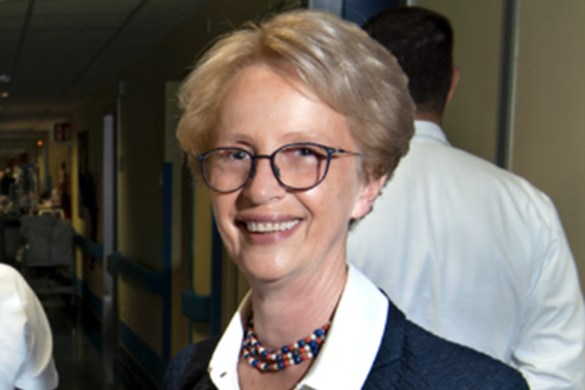
Prof. B. Bodini interviews Mrs. Joke Jaarsma, President of EFNA – European Federation of Neurological Associations (www.efna.net ).
The Covid-19 pandemic required urgent measures and EAN has set up the EANcore CoVid-19, a resource that aims to help neurologists in Europe and beyond, prepare for and manage the challenges this global crisis is bringing.
Mrs Jaarsma, the EAN is very much aware that the EFNA and all its members look at you for reactions and input to this pandemic and, as a member of the EANcore CoVid-19 task force, I am honoured to interview you on this topic.
As president of EFNA, you have a global overview of the impact that Covid-19 pandemic is having on patients with neurological diseases. Are there specific groups of patients with neurological diseases who seem to be most severely affected by Covid-19 symptoms?
Generally speaking, patients with a neurological illness do not have a weakened immune system, and they are therefore not more likely to catch Covid-19. An exception here are our patients taking immunosuppressants, in myasthenia gravis for example. And patients who are bedridden and sometimes undernourished, such as for example in Huntington’s disease. These patients often are more likely to develop pneumonia and thus possibly Covid-19.
The isolation and the changes in daily routines sometimes lead to depression for the patients in several of our member organizations.
We are aware that some Covid-19 patients, and physicians, are reporting neurological symptoms and complications – and this will be important for us to further study and understand.
Also, we are concerned to hear people living with neurological disorders are now slower to present for medical help due to their fears of being infected with Covid-19 in the hospital or other medical settings. This is particularly worrying in the case of stroke, for example, where figures are suggesting that less people are now presenting to accident and emergency departments around Europe with suspected strokes. This concern also extends to those with chronic neurological conditions who can no longer access their outpatient clinics, rehabilitation centers, support services and so on. Many people with neurological disorders are seeing an exacerbation of their symptoms and cannot seek the help they need due to the reallocation of resources and restructuring of care. This will place further burden on health systems and services in the aftermath of the pandemic.
And one major thing worth mentioning are the issues around those vulnerable groups such as the elderly, disabled, people in residential institutions, etc. who are sometimes being triaged out of the system when presenting with Covid-19 symptoms as younger people with no underlying conditions are being prioritized for care when resources are limited.
Do you think that there have been major differences across European countries in the way patients with neurological diseases have been treated for Covid-19? What can we learn from the different approaches that different countries have taken?
Countries have divergent health system capacity, and as we have seen many are struggling with finding the resources to deal with the pandemic. Many of our member patient organizations are providing timely information updates for their communities regarding Covid-19, which we have included in the Covid-19 information on our website; this ensures an effective flow of information and answers to concerns (www.efna.net, Covid-19: Resource Hub for neurology patients).
An important issue is the delivery of medical supplies. Although medicine shortages are not posing a major challenge for the community just now, this situation should be continually monitored, and action taken as soon as a threat to the supply chain is detected.
The Covid-19 crisis has revealed gaps and weaknesses in our health systems. Strengthening health systems is not only a national matter – it is an urgent European and global health policy priority.
What are your recommendations for patients with neurological diseases once the lockdown measures start to come to an end?
New insights no doubt will help the patient community in the future. Patients have had to deal with email and videocalls in contacts with their physicians, as well as develop better self management strategies.
This crisis has highlighted the fragmentation between our health, social and economic affairs but also emphasized the need for increasing cross-sectoral collaboration to address the health of our societies. Following this pandemic this cooperative approach must be encouraged.
But beyond health and social care, our thoughts turn to research. During the pandemic, neuroscientists across Europe left their labs as universities closed and the focus shifted to understanding and defeating Covid-19. Despite many researchers continuing to work productively from home – or turning their attentions to the fight against this virus – the pace of research in our field has inevitably slowed down. Neglecting neuroscience research, however, will have repercussions in the years to come. Numbers are growing. More than 1 in 3 people will have a brain disorder in their lifetime – neurological disorders alone are the leading cause of disability and the second leading cause of death worldwide. This costs the EU economy over 800billion euros per year. And, yet, we still have no cure for almost all of these disorders. Unless we continue to fund basic research into the underlying mechanisms of these diseases and clinical research to find more optimal treatments and – eventually – cures, these disorders will place an unsustainable burden on our societies.
Therefore, in the recovery phase, it will be critical that the European Commission, the pharmaceutical industry and other research funders maintain their commitment to supporting brain science, research and innovation. Brain disorders do not stop for Covid-19 – in fact there is emerging data to suggest that the virus may cause neurological complications. So, in the aftermath of the pandemic, there should be a substantial increase of available funding under Horizon Europe for health research and supporting disciplines – with neuroscience continuing to be a priority. Our industry partners must also continue to invest in stronger neuroscience pipelines. Alongside such increased levels of research, better coordination and more efficient data management will be required.
Through science we will defeat this pandemic, but only through a reinvigorated neuroscience agenda, to make up for the time we have lost in these difficult months, will we defeat the emergency posed by neurological disorders – which could claim many more lives in the coming years.
For now, we must also ensure that we are collecting the data we need to assess the ongoing impact of this virus on those living with neurological disorders and any neurological complications that may arise in those who have been affected. Recommendations and guidelines will need to be produced and reassessed on an ongoing basis. Active participation of patients in the planning and implementation of activities around Covid-19 will be important. All this will be essential in the ongoing care of our patient community and those who will be diagnosed with Covid-19 in the weeks and months ahead.











